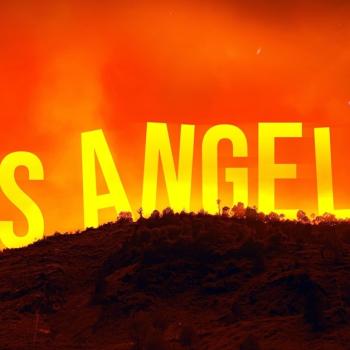Editors' Note: This article is part of the Patheos Public Square on Global Care: Why We Need More Than One Earth Day in a Year. Read other perspectives here.
Evangelical Christianity stands in the way of progress on caring for creation. The culprit is the Bible that, for the birds and the bees, is not at all the "Good" Book. By insisting that their beliefs be grounded in the Bible, evangelicals have made it impossible for their communities to escape Bronze Age notions about the origins and limitations of the natural world.
The Bible, in its dominant themes and stories, treats the earth and its non-human inhabitants as afterthoughts. Take the story of the great flood, recently brought to life on the big screen with Russell Crowe as the intrepid ark builder. The classic account in Genesis 6 reports that "God saw how corrupt the earth had become, for all the people on earth had corrupted their ways." In response God says to Noah, "I am going to put an end to all people, for the earth is filled with violence because of them."
Notice what is missing in God's description of the horrific plan — any mention of the innocent animals that will die as collateral damage in the great judgment upon humanity. As a child I learned this story as a warning about the wages of sin. And in what now seems so illogical I can hardly believe I accepted it, even as a toddler, God's "rescue" of a few animals on the ark was presented as a concern for the animals. No mention was ever made of all the animals that died unnecessarily. Flannel graph images in Sunday school illustrated human sinners flailing in rising floodwaters or pounding on the ark and pleading with Noah to save them. But no images showed the mother Koala gathering her young to her breast, carrying them to the top of the tallest tree, and then watching them being ripped from her and drowned as the floodwaters rose.
The destruction of so much animal life is passed over without mention.
Consider the motif of animal sacrifice, a barbarous practice now largely gone from the world, but common in the Hebrew Scriptures. The innocence of the animals slain in these rituals is trivialized. All that matters is that human sin is being "washed away" by innocent blood. This practice ended with Christianity's embrace of Jesus' sacrifice as "once and for all," but there is no acknowledgement that this development brought a literal salvation to countless animals.
Take the story of the Fall in Genesis. The Bible states that there was no death of any sort for any creatures before Adam sinned. Most evangelicals believe that God's response to Adam included the arrival of death for animals, as well as humans, as I argue in my forthcoming book Saving the Original Sinner: How Christians Have Used the Bible's First Man to Oppress, Inspire, and Make Sense of the World. Zebras began to be eaten by lions because of human sin. Is this fair? Of course not, but one would never know that by reading the Bible.
The Bible, to be fair, did not champion the mistreatment of animals in opposition to prevailing calls for kindness from contemporary cultures. The Bible simply reflected the widespread belief that animals were relevant only if they were useful to humans.
The exclusive reliance on the Bible as its only authority — Luther's infamous "sola scriptura" — makes it all but impossible for evangelicals to escape the strait jacket of biblical blind spots. The worst of those is the Bible's disregard for animal life. Progressive evangelicals alarmed about their community's disregard for the natural world have creatively mined the Bible for counterexamples to its prevailing apathy about nature. The heroic but ineffective Evangelical Environmental Network, for example, proclaims proudly that its ministry "is grounded in the Bible's teaching on the responsibility of God's people to "tend the garden" through a faithful walk with our Lord Jesus Christ." They have, indeed, found such "teaching" in the Bible but it is buried under tales of demoralizing disregard for nature's welfare.
There are two solutions to this problem, neither of which is available to evangelicals. 1) The Roman Catholic solution is — and has always been — to reject sola scriptura in favor of a more broadly informed and evolving authority. Papal injunctions to care for creation, such as those made by Pope Francis, have an authority for Catholics similar to that of the Bible for evangelicals. And such insights can be informed by an awareness of the limitations of the earth not available in the Bronze Age. 2) The liberal Protestant solution is to simply acknowledge that the Bible is an ancient book written by ancient thinkers and it got some things wrong.




